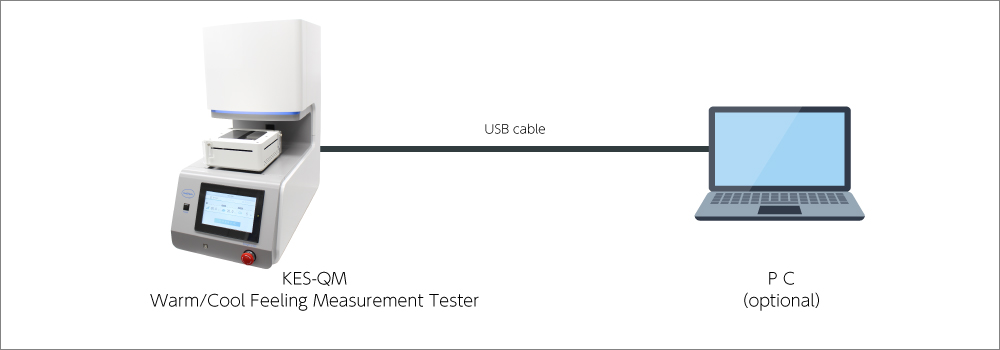

The sensation of coldness or warmth when skin touches an object is referred to as the “coldness and warmth feeling.” The feeling of coldness or warmth will vary depending on the amount of heat transferred from the skin to the object. This device measures that feeling automatically by evaluating the “qmax” value (peak heat flux).
Test standard:
JIS L 1927 Textiles-Measurement method of cool touch feeling property
GB/T 35263-2017 Textiles-Testing and evaluation for cool sensation at contact instant
CNS15687, L3272 Method of test for the instantaneous cool sensation fabrics
The KES-QM can be used to evaluate such products as bedding material meant to offer a feeling of coldness in summer, and underwear material meant to offer contact warmth in winter.
The load and contact area of the heat plate that contacts the target sample are designed to simulate the feeling you experience when touching an object. This technology allows a maximum heat transfer rate that is closer to human sensation can be measured.
Automatic measurements can be performed up to 10 consecutive times.
The automation has also improved the accuracy of the measurement values.
Space saving is realized by built-in thermo cool that keeps the temperature of measuring sample constant.
All measuring operation with touch panel. Measurement condition can be set up easily.

| Model, Product Name |
KES-QM Warm/Cool Feeling Measurement Tester |
| Dimensions (W × D × H) *approx. | Measuring unit: 330 × 620 × 664 mm |
| Weight *approx. | Measuring unit: 42 kg |
| Power supply, Frequency | 100 to 240VAC, 50/60Hz |
| Interface | PC (optional) *1 |
| OS | Windows 7/8/8.1/10 |
| Sample size | 180 × 180 mm (standard) Thickness: 25 mm (or less) |
| *1 PC is not included. We are able to prepare for PC with an appropriate specification. |
KES (Kawabata Evaluation System)
The Kawabata Evaluation System, centered on Sueo Kawabata, a professor at Kyoto University, and Masako Niwa, a professor at Nara Women’s University, is an objective evaluation method for measuring the texture of clothing fabrics based on the “The Standardization and Analysis of Hand Evaluation” provided by the Hand Evaluation and Standardization Committee of the Textile Machinery Society of Japan.